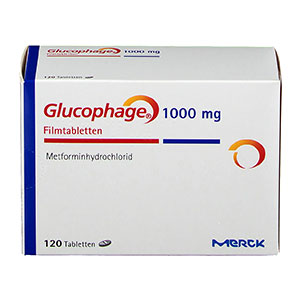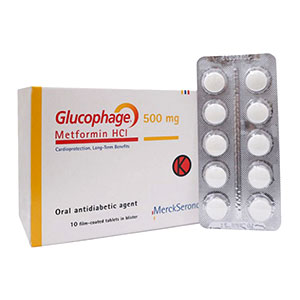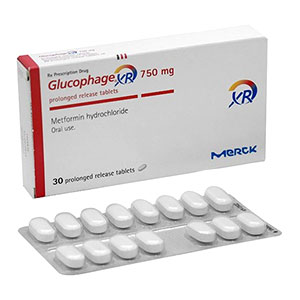The largest price comparison for medicines: the most popular pharmacies in comparison. Buy more than 200 medicines at low prices






Patent: Patent expired
Producer: Merck & Co.
Dosage: 500mg, 850mg, 1000mg
Dosage form: film-coated tablet(s)
Unit of measurement: mg
Active ingredient: metformin
Application areas:
Type-2 Diabetes
Drug class:
Onset of action:
Duration of action: -

Bioavailability: 50-100%
ATC-Code: A10BA02, A10BD23, usw.
Protein binding: 0-10%
Metabolism: No data available
Metabolites:
Half-life: 4-8.7 hours
Excretion: Urine
CAS number: 1115-70-4
PubChem-CID: 4091
Drug Bank: DB00331
ChemSpider: 3949
UNII: 786Z46389E
KEGG: C07151
ChEBI: CHEBI:6801
ChEMBL: ChEMBL1431
ECHA-InfoCard: 100.010.472
Formula: C4H11N5
Molar mass: 129,16 g·mol−1
Glucophage contains the active substance metformin hydrochloride, which belongs to the biguanide family. Metformin lowers blood sugar levels in patients with diabetes and increases the sensitivity of muscle cells to insulin. The cells are therefore better able to remove the sugar from the blood. Metformin also slows the absorption of sugar from the gut.
Glucophage is taken by mouth. It should be used with a glass of water during or after a meal. The daily dose depends on the patient's body weight, whether they have concomitant diseases and whether they are taking another drug.
The recommended starting dose for adults is either 500 mg or 850 mg 2 or 3 times a day. The maximum daily dose is 3000 mg, divided into 3 intakes and should not be exceeded. These tablets should be taken with meals to reduce the risk of nausea and vomiting.
For children 10 years and older and adolescents, the starting dose is 500 mg or 850 mg once a day. The maximum daily dose is 2000 divided into 2 or 3 doses.
It should be taken at breakfast if the daily dose is to be taken all at once.
The tablets are taken at breakfast and at dinner if the daily dose is divided into 2 intakes.
If the daily dose is divided into three doses, the tablets should be taken in the morning (breakfast), midday (lunch) and evening (dinner).
Caution when taking or using certain medicines
risk of lactic acidosis
Hypersensitivity to the ingredients
Liver diseases
Impaired kidney function
Cardiac insufficiency
Uncontrolled diabetes
Excessive alcohol consumption
Heart attack
Shortness of breath
Severe circulatory problems
Severe infections
Dehydration
Not safe
Alcohol consumption increases the risk of complications
Do not take a double dose to make up for a forgotten dose. For the next dose, do not take more than the usual recommended amount.
Serious side effects can occur after taking excessively high doses. If you experience severe side effects, seek medical help immediately.
There is a risk of serious interactions. Therefore, regular medical monitoring is required.
Diarrhea
Nausea
The effect of the drug is influenced by the food.
Take Glucophage with or after a meal to avoid side effects affecting your digestion.
Keep this medicine out of the sight and reach of children.
This medicinal product does not require special storage conditions.
In what dosages can Glucophage be bought?


Can I take Glucophage for type 1 diabetes?


Can you buy Glucophage in Germany without a prescription?


What is the name of the active ingredient in Glucophage?


How much does Glucophage cost? Glucophage price


Glucophage (metformin) is a prescription medication primarily used to treat type II diabetes. It is produced in the form of film-coated tablets and sustained-release tablets (Glucophage SR) by Merck KGaA. The active substance in both dosage forms is metformin hydrochloride.
In adults, this medicine can be used alone or in combination with other blood sugar lowering medicines or insulin. Glucophage is not suitable for the treatment of type 1 diabetes. In children from the age of 10 and adolescents, it can be considered alone or together with insulin.
This antidiabetic helps to lower the patient's blood sugar to as normal a level as possible. In overweight adult patients, long-term administration contributes to reducing the risk of diabetes-related complications. According to the manufacturer, taking it can lead to moderate weight loss.
You can also buy Glucophage to prevent diabetes. New data were presented at the 2019 American Diabetes Association Scientific Sessions demonstrating the effectiveness of long-term use of metformin in preventing the development of type II diabetes in women with gestational diabetes.
Like all medicines, Glucophage can cause side effects. Contact your doctor if you experience any or some of the side effects below:
Although most of the side effects listed below are rare, they can lead to serious problems if you do not consult your doctor. See a doctor right away if any of the following side effects occur:
You should stop taking the drug and see a doctor right away if you have any of the following symptoms: lactic acidosis, seizures, signs of pancreatitis (eg, upper abdominal pain, back pain, nausea, fever, chills, rapid heartbeat).
According to the manufacturer, symptoms of an overdose include:
Metformin tablets can interact with several other medications. Different interactions can have different effects.
Simultaneously taking Glucophage with iodinated contrast media is contraindicated. Treatment with Glucophage should be stopped 48 hours before or at the time of the X-ray examination with iodinated contrast media, depending on renal function, and should be restarted no earlier than 48 hours after, provided renal function is normal.
Alcohol consumption is discouraged during treatment with Glucophage. Acute alcohol intoxication increases the risk of lactic acidosis, especially with a low-calorie diet and liver failure.
Caution should be exercised when administered concomitantly with the following medicines and medicinal substances:
Before starting treatment, tell your doctor or pharmacist about all prescription and over-the-counter drugs, vitamins, herbs, and dietary supplements you are taking to avoid potential drug interactions.
If you have any questions about drug interactions, consult your doctor or pharmacist.

Glucophage works very well for me with no side effects (maybe a bit of diarrhea and gas - but this helps to get rid of my constipation). I am a 65 year old male, not overweight. Got type 2 diabetes from drinking way too much Coca Cola and eating lots of sweets (donuts, cakes, candy, etc.). I never knew that sugar is a poison that affects metabolism. Started taking Glucophage (3 x 800 daily dose) two years ago. By changing my diet, my blood sugar level dropped from 358 to 130 and HbA1c from 15.9 to 6.7. Glucophage is the only medication that works for me.
18.01.2022
My experience with Glucophage was so bad that I'd rather ignore my high blood sugar than continue treatment.
03.03.2021


Subscribe to our newsletter and get the latest updates and special offers!
Leave a comment
Thank you for sharing your experience!
Your experiences will be published soon!